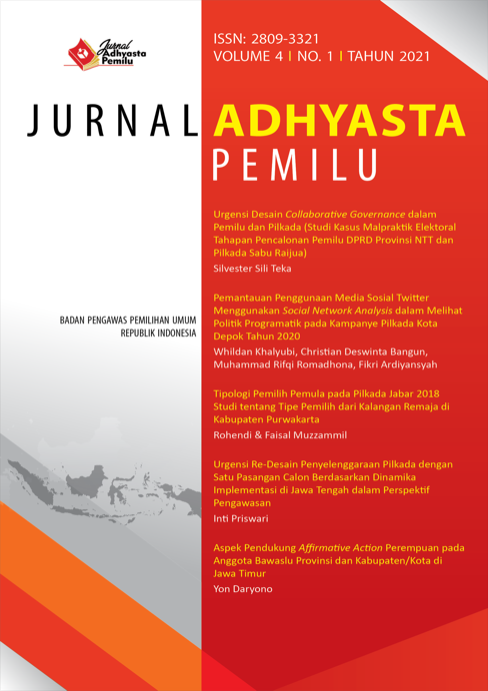Urgensi Desain Collaborative Governance dalam Pemilu dan Pilkada
Studi Kasus Malpraktik Elektoral Tahapan Pencalonan Pemilu DPRD Provinsi NTT dan Pilkada Sabu Raijua
DOI:
https://doi.org/10.55108/jap.v4i1.44Kata Kunci:
collaborative governance, electoral malpractice, election, nomination stageAbstrak
This paper offers collaborative governance as a concept of strengthening collaboration between institutions in the implementation of elections and local elections, namely by examining the phenomenon of electoral malpractice cases in the nomination stages in the 2019 NTT Provincial DPRD Election and the 2020 Sabu Raijua Regent and Deputy Regent Election. This study uses qualitative research methods descriptive with analysis techniques and data collection based on primary data and secondary data and literature study. The study results based on the case studies in this paper found that the concept of collaborative governance was able to overcome the weakness of the rules and the limitations of the authority of the election organizers at the election and regional head elections. This is evidenced by the potential for electoral malpractice in the nomination stage, which lies in the weakness of the rules for the verification mechanism for only administrative candidate requirements, so they are prone to be manipulated by candidates. At the same time, it is known that the validity and correctness of candidate requirements documents is the domain of authority of institutions outside the Organizing Institution Election (LPP). Therefore, collaboration and synergy between election organizers and stakeholders are needed based on collaborative governance to prevent electoral malpractice. The collaborative governance approach encourages collaborative problem solving involving stakeholders based on mutual trust and commitment and is oriented towards consensus. The cycle of collaborative governance that must be passed is face-to-face dialogue, trust-building, commitment to the process, shared understanding, and intermediate outcomes. Furthermore, legal norms are needed to regulate inter-institutional cooperation for election organizers to strengthen collaborative governance.
Unduhan
Referensi
Albab, A. U. (2018). Problem Kewenangan Mahkamah Konstitusi Memutus Perselisihan Hasil Pilkada. Jurnal Hukum & Pembangunan, 48(3), 542. https://doi.org/10.21143/jhp.vol48.no3.1745
Amir, I. (2021). Disqualification of the Candidate Pair for the Elected Regional Head of Sabu Raijua Regency. Al-Bayyinah Jurnal Hukum Islam, 5(2), 196–213. https://doi.org/10.35673/al-bayyinah.v4i2.1830
Ansell, C., & Gash, A. (2008). Collaborative governance in theory and practice. Journal of Public Administration Research and Theory, 18(4), 543–571. https://doi.org/10.1093/jopart/mum032
Antara. (2021). 6 Kali Bawaslu Menyurati Kemenkumham Soal Status Orient Riwu Kore Tak Direspon. Tempo.Co. https://nasional.tempo.co/read/1429885/6-kali-bawaslu- menyurati-kemenkumham-soal-status-orient-riwu-kore-tak-direspon
Charity, M. L. (2016). Urgensi Pengaturan Kewarganegaraan Ganda Bagi Diaspora Indonesia. Jurnal Konstitusi, 13(4), 809–827.
Emerson, K., Nabatchi, T., & Balogh, S. (2012). An integrative framework for collaborative governance. Journal of Public Administration Research and Theory, 22(1), 1–29. https://doi.org/10.1093/jopart/mur011
Emzir. (2016). Metodologi Penelitian Kualitatif: Analisis Data. Rajawali Pres.
Encep Sujana, Saktinegara, Y. D., Perkututo, H., Ahmad, R. L. G., & Sartono. (2021). Status Kewarganegaraan Ganda dalam Pencalonan Bupati Ditinjau dari Perspektif Hukum Kewarganegaraan (Analisa Putusan Nomor 135/PHP.BUP-XIX-2021). Jurnal IKAMAKUM, 1(2), 705–725. http://openjournal.unpam.ac.id/index.php/IKAMAKUM/article/view/15520
Erwanti, M. O. (2021). Besok, Kemendagri-KPU-Bawaslu Rapat Bahas Status WN AS Orient P Riwu Kore. Detik.Com.
Indrayana, D. (2019). Strategi Memenangkan Sengketa Pemilu di Mahkamah Konstitusi. Kompas.
Islamy, L. O. S. (2018). Collaborative Governance Konsep Dan Aplikasi. Deepublish.
Karim, A. G. (2020). Mencegah Electoral Malpractice dalam Penundaan Pilkada 2020 (Issue April). https://polgov.fisipol.ugm.ac.id/riset/policy-brief-mencegah-electoral- malpractice-dalam-penundaan-pilkada-2020
Nengsih, N. S., Akmal, M., Khairi, M., Abid, M. F., & Solihin, M. (2019). Integritas KPU dan Pemilihan Umum. Jurnal Stisipol Raja Haji, 1(1), 51–61. https://journal.stisipolrajahaji.ac.id/index.php/jisipol/article/view/5
Pradana Jaa. (2021). Kronologi Keabsahan Dokumen Dugaan Pelanggaran Calon Bupati Sabu Raijua Orient P. Riwu Kore Kewarganegaraan AS. Bawaslu.Go.Id.
Sedarmayanti, & Aziz. (2020). DINAMIKA GOVERNANCE DI ERA REVOLUSI INDUSTRI 4.0. Refika.
Subkhi, M. I. (2020). Redesain Pendaftaran Pemilih Pasca Pemilu 2019. Jurnal Penelitian Politik, 16(2), 137. https://doi.org/10.14203/jpp.v16i2.797
Surbakti, R., Karim, A. G., Nugroho, K., Sujito, A., & Fitrianto, H. (2014). Integritas Pemilu 2014: Kajian Pelanggaran, Kekerasan, dan Penyalahgunaan Uang pada Pemilu 2014. Kemitraan bagi Pembaruan Tata Pemerintahan.
Tambun, L. T. (2021). Besok, Kemdagri, KPU, dan Bawaslu Gelar Rapat Bahas Status WN Orien P Riwu Kore. BeritaSatu.Com. https://www.beritasatu.com/politik/727845/besok- kemdagri-kpu-dan-bawaslu-gelar-rapat-bahas-status-wn-orien-p-riwu-kore
Unduhan
Diterbitkan
Cara Mengutip
Terbitan
Bagian
Lisensi
Hak Cipta (c) 2021 Silvester Sili Teka

Artikel ini berlisensi Creative Commons Attribution 4.0 International License.



